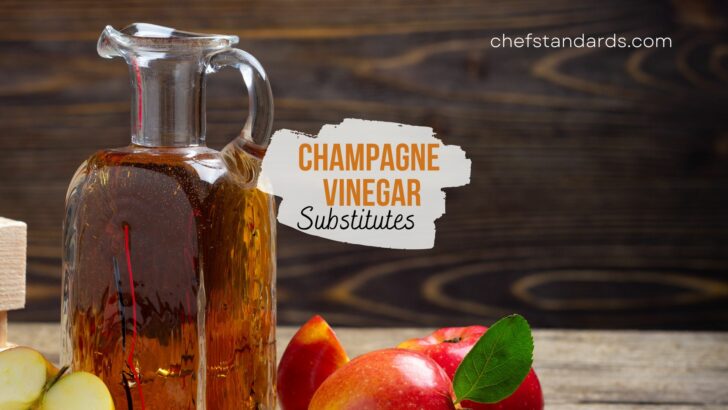I believe that you have all heard about one of the classics among beverages, Champagne wine. Many people can not imagine any major event without it and celebrating New Year with a few glasses has become a worldwide tradition.
But did you know that Champagne wine has a younger brother that is also very popular in the kitchen? It is Champagne vinegar, also known as “vinaigre de Champagne”.
It is known for its mild acidity and subtle fruity undertones. It can be used in many culinary applications, including salad dressings, vinaigrettes, marinades, and sauces.
However, not everyone has access to it all the time, so a few good Champagne vinegar substitutes can come in handy from time to time, and, in this article, you will get to know them.
1. White Wine Vinegar
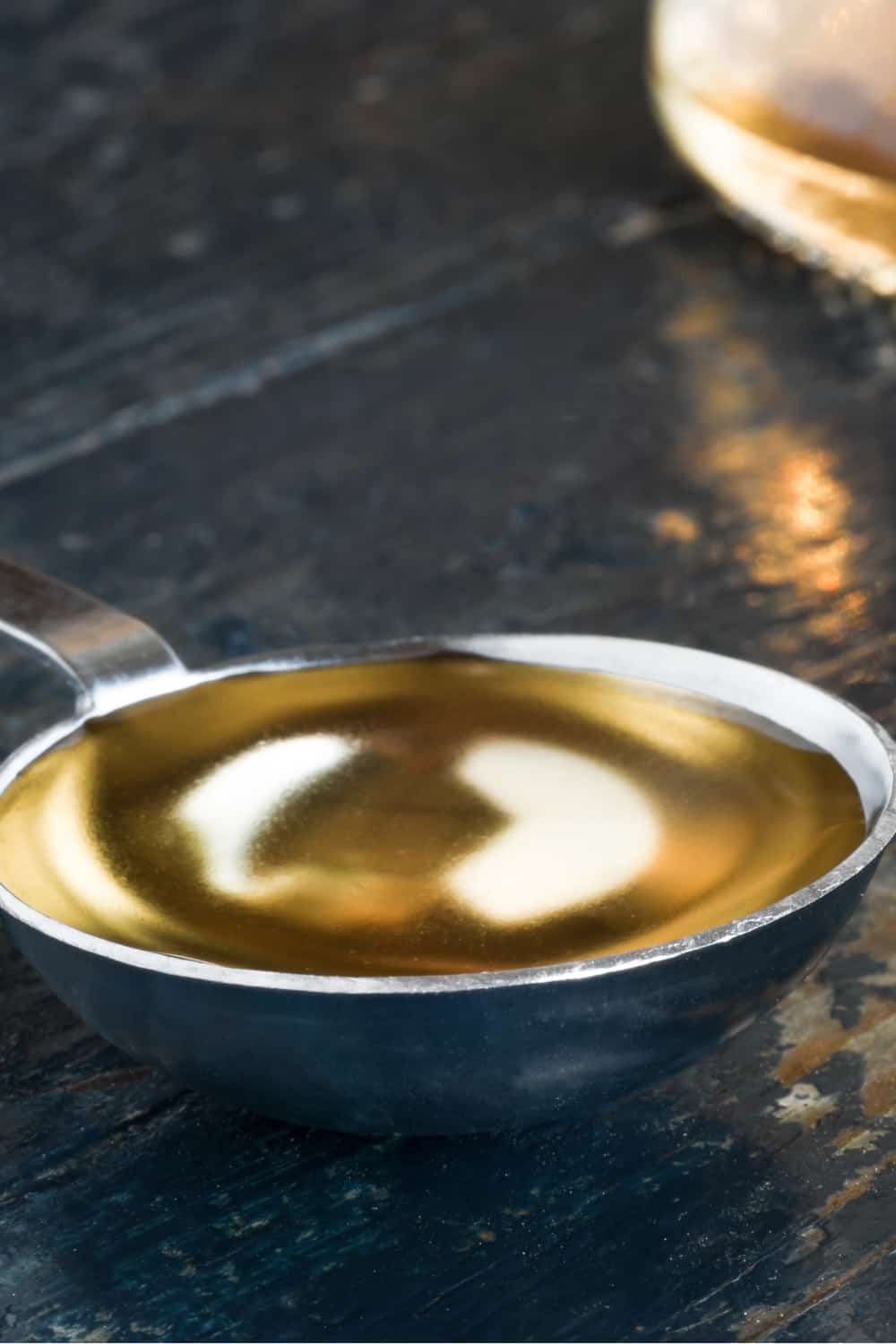
As the name suggests, this is a type of vinegar made from white wine. It is by far the best Champagne vinegar alternative and there are many reasons for this. However, it also has some cons, so let’s take a look.
Similarities:
• The most obvious similarity is the fact that both beverages are made during the vinegar production process, which involves the fermentation of wine, where the alcohol present in the wine is converted into acetic acid by bacteria known as acetobacter.
• Both Champagne vinegar and white wine vinegar has thesame level of acidity.
• Both kinds of vinegar offer a delicate and nuanced flavor profile, and they both bring a pleasant acidity that complements a range of dishes.
Differences:
• The primary difference lies in the base wine used for each vinegar since Champagne vinegar is specifically made from Champagne or sparkling wine, while white wine vinegar is made from a variety of white wines.
• While Champagne vinegar is known for its light, delicate, and refined flavor with fruity undertones, white wine vinegar has a broader range of flavor profiles, depending on the type of white wine used. It iss all in the specific flavor of the wine.
• It is also harder to find Champagne vinegar than white wine vinegar and it is generally more expensive due to its association with Champagne.
How To Use As A Substitute:
When making this substitution, I would suggest you start by using the same amount.
Champagne vinegar can have a more pronounced flavor compared to the delicate taste of white wine vinegar. So if you want a more subtle flavor to your dish, do not add it too much.
Acidity is also very important in this whole scenario. White wine vinegar may have a slightly higher acidity compared to Champagne vinegar.
So taste your dish as you add the white wine vinegar and adjust the acidity level by balancing it with other ingredients. If necessary, you can add a pinch of sugar or a small amount of honey to counterbalance the acidity.
When it comes to dishes, you can add white wine vinegar to salad dressings and marinades, and the slightly sweet flavor can also be good for sauces and stews.
In general, you can use it in most recipes that require Champagne vinegar.
2. Sherry Vinegar
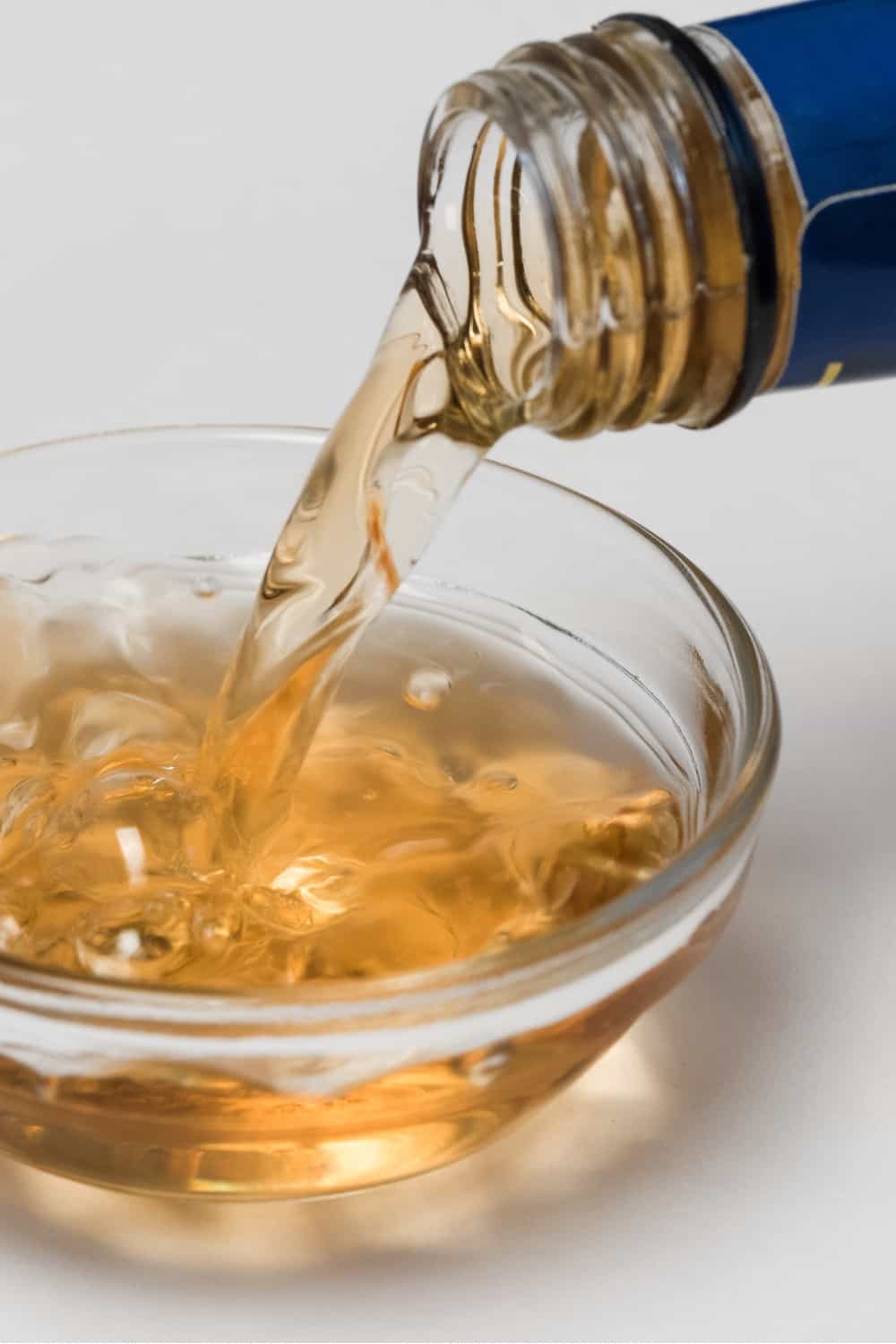
This type of vinegar is made from sherry wine. It is highly regarded for its distinct flavor and is known as one of the finest vinegar varieties available.
Similarities:
• The production process for both of these vinegars involves acetification, where the alcohol in the base wine is transformed into acetic acid through the action of acetobacter bacteria.
• Champagne vinegar and sherry vinegar both offer a complex flavor profile that sets them apart from basic distilled vinegar.
• Finally, both vinegars are regarded as high-quality vinegars that are prized for their craftsmanship and distinct characteristics.
Differences:
• The most noticeable difference between these two is the fact that they do not share the same wine base.
• Therefore they have different flavor profiles, i.e., sherry vinegar has a robust taste with a well-balanced acidity, featuring a slight sweetness and nutty undertones derived from the aging process in oak barrels.
Champagne vinegar, on the other hand, has a delicate and refined flavor profile, often displaying subtle fruity notes from the grapes used in Champagne production.
• Finally, sherry vinegar undergoes a significant aging process in oak barrels, which can last for several years.
While Champagne vinegar may undergo some aging, it typically does not require the same level of aging as sherry vinegar.
How To Use As A Substitute:
First, you have to know that their flavor profiles are different since sherry vinegar has a robust taste with nutty undertones and slight sweetness.
It also has a stronger and more pronounced flavor compared to Champagne vinegar, so my advice is to use only half the amount. If you prefer a bit stronger flavor, you can freely add a bit more.
When it comes to acidity, they have similar acidity levels, but since the flavor profile of sherry vinegar is a bit more pronounced, you can add a touch of sweetness to balance the acidity and to counteract the stronger flavor.
Finally, sherry vinegar’s rich and complex flavor makes it suitable for savory dishes, such as stews, sauces, and braises.
3. Apple Cider Vinegar

Apple cider vinegar is a type of vinegar that is made from fermented apple cider or apple juice. It has a characteristic amber color and a strong, tangy flavor with a distinct apple undertone. In some cases, it can be a good alternative.
Similarities:
• Aside from the fact that both apple cider vinegar and Champagne vinegar are produced during the fermentation process, both can be found in natural, unfiltered, and unpasteurized forms.
• If consumed the right way and in moderation, they can provide many health benefits.
• Both are widely available in many stores, supermarkets, and online retailers.
Differences:
• Since the base ingredients of these two types of vinegar are different, their flavor profiles also differ, i.e. apple cider vinegar has a robust, tangy flavor with a pronounced apple undertone.
• Another big difference between the two is their acidity levels. While Champagne vinegar has a decent acidity level, the acidity level of apple cider vinegar is much higher, and it is even considered one of the most acidic kinds of vinegar.
• Apple cider vinegar is made through a two-step fermentation process involving yeast and bacteria.
The crushed apples undergo alcoholic fermentation to convert the sugars into alcohol, followed by acetic acid fermentation to produce vinegar.
Champagne vinegar, on the other hand, is made by fermenting Champagne or sparkling wine with bacteria to convert the alcohol into acetic acid.
How To Use As A Substitute:
Different flavor profiles are important, but it is even more important to consider different acidity levels.
The acidity level of apple cider vinegar is much higher than that of Champagne vinegar. It is therefore important to use about half of the amount if you don’t want to end up with a dish that is too tangy in flavor.
If that isn’t enough, you can also add some sweet ingredients to balance the acidity, such as a pinch of sugar or a small amount of honey.
Once you do that, you can use apple cider vinegar in various types of dishes, including different savory dishes, dressings, marinades, and sauces.
See Also: 18 Tangy And Zesty Apple Cider Substitutes For Cooking
4. White Vinegar
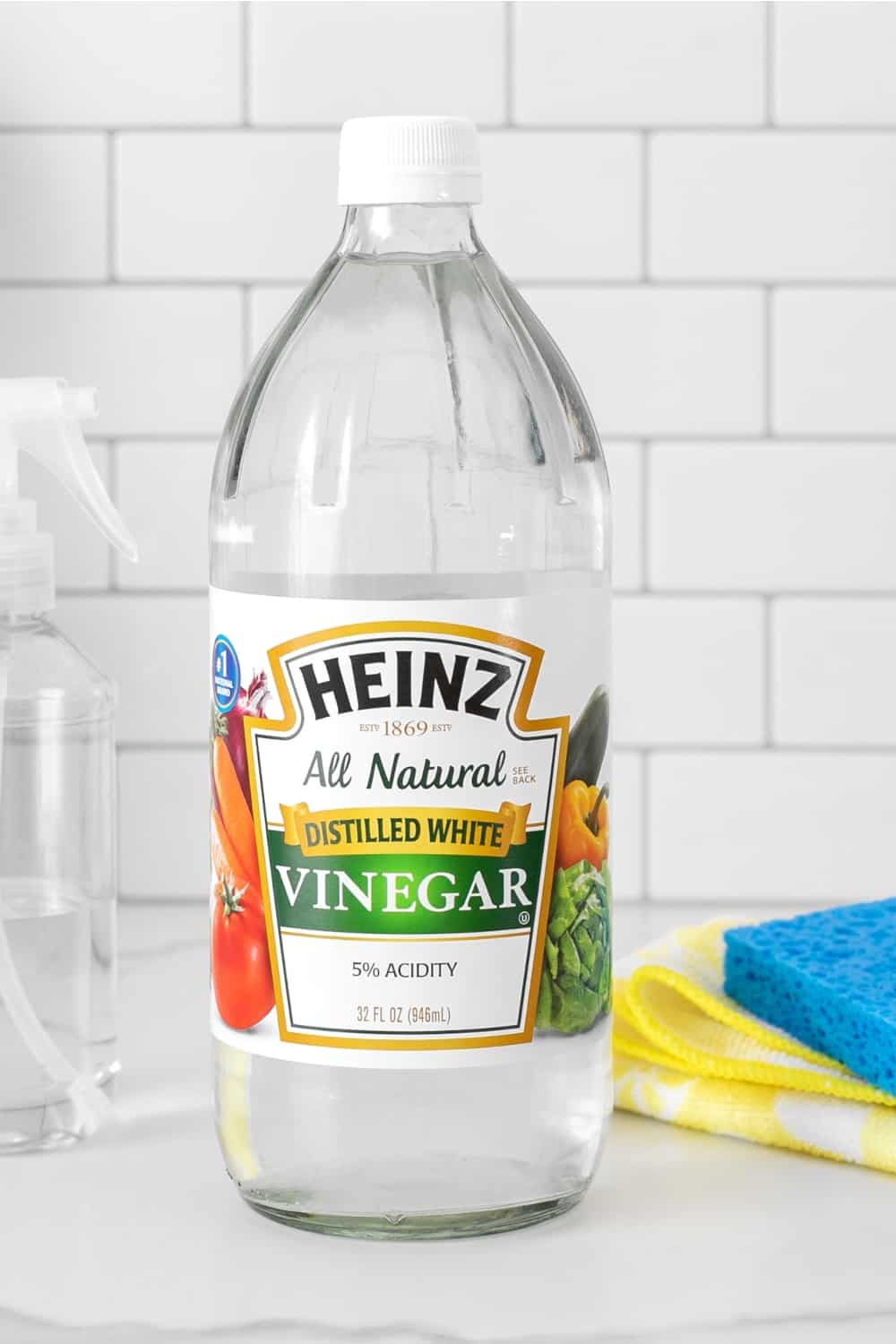
Although it sounds similar as white wine vinegar, these two products are different. Namely, white vinegar, also known as distilled vinegar or spirit vinegar, is a type of vinegar that is made from the fermentation of distilled alcohol.
Similarities:
• The most noticeable similarity between Champagne vinegar and white vinegar is their clear and colorless appearance.
• Both types are produced through the fermentation of alcohol but undergo further processes to convert the alcohol into acetic acid, resulting in the absence of alcohol content in the final product.
• They are both widely available in many supermarkets and grocery stores.
Differences:
• Since they are made from different base ingredients, they also have different flavor profiles. White vinegar has a strong, sharp, and pungent flavor, while Champagne vinegar has a more delicate and refined flavor with subtle fruity and floral notes.
• White vinegar typically has a higher acidity level compared to Champagne vinegar, i.e., it can have an acidity level of around 5% to 7%.
• I also have to mention that their production processes are different.
How To Use As A Substitute:
The first thing you need to consider is the fact that these two types of vinegar have distinct flavor profiles and intensities, so you’ll have to make some adjustments when using it as a substitute.
Since the intensity is higher, it is best to use a slightly less amount. For this purpose, you can also dilute it with water or another liquid component used in the recipe.
Since white vinegar lacks the sweetness of Champagne vinegar, many chefs tend to add some type of sweetener, like small amounts of sugar or honey.
I normally use white wine for that purpose because it can add a decent amount of sweetness. Red wine is also an option if you want to give your dish a deeper, fruitier flavor.
Finally, when it comes to culinary applications, it is best to use white vinegar in marinades, dressings, pickling, and sauces that can handle its robust flavor.
5. Rice Wine Vinegar
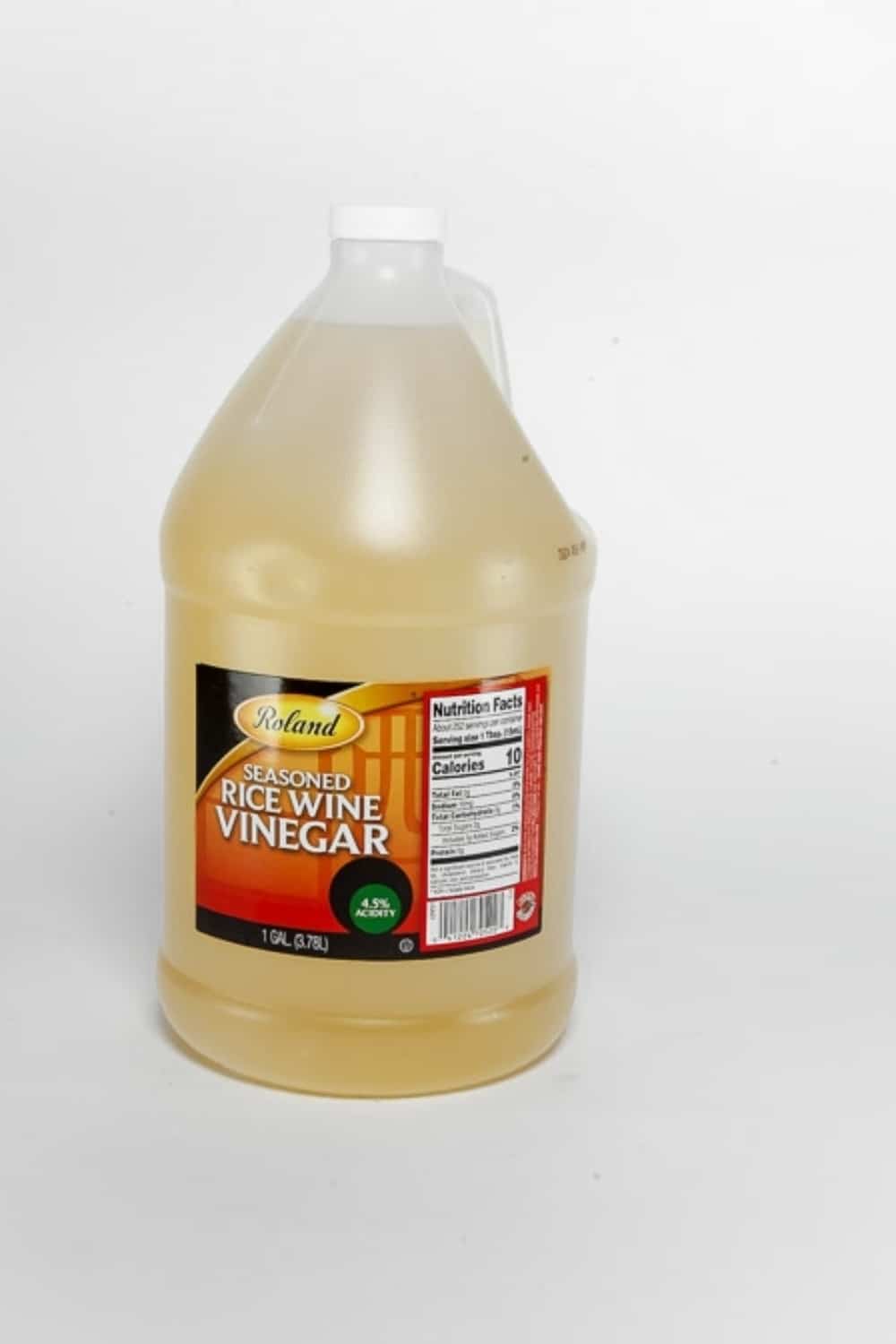
Rice wine vinegar, also known as rice vinegar, is a type of vinegar made from fermented rice. It can be a decent alternative to Champagne vinegar.
Similarities:
• Both rice wine vinegar and Champagne vinegar have a relatively mild acidity compared to other types of vinegar.
• Both types have a more delicate flavor profile compared to other stronger types of vinegars.
• Both rice wine vinegar and Champagne vinegar are readily available in many supermarkets, grocery stores, and specialty food shops.
Differences:
• Since the base ingredients are different, their flavor profiles also differ, i.e., rice wine vinegar offers delicate tanginess compared to the more complex and refined flavor profile of Champagne vinegar.
• While they are both mildly acidic, I have to emphasize that rice wine vinegar typically has a milder acidity.
• Finally, the color is different, i.e. rice wine vinegar typically has a light yellow to pale amber color, while Champagne vinegar can range from pale yellow to a deeper golden hue.
How To Use As A Substitute:
As with all other types of vinegar, you first need to consider the flavor differences, i.e. the more sweetness and subtle rice undertones of rice vinegar compared to the fruity and floral notes of Champagne vinegar.
Also, rice wine vinegar is milder, so you may have to put it in a slightly larger quantity to achieve a similar level of acidity and flavor impact.
Its milder taste makes it a great choice for salads and other dishes where you don’t want the vinegar taste to be too overpowering.
Its slight sweetness can be a nice contrast in many savory dishes, and its thinner consistency can be great for vinaigrettes and other light sauces.
6. Red Wine Vinegar
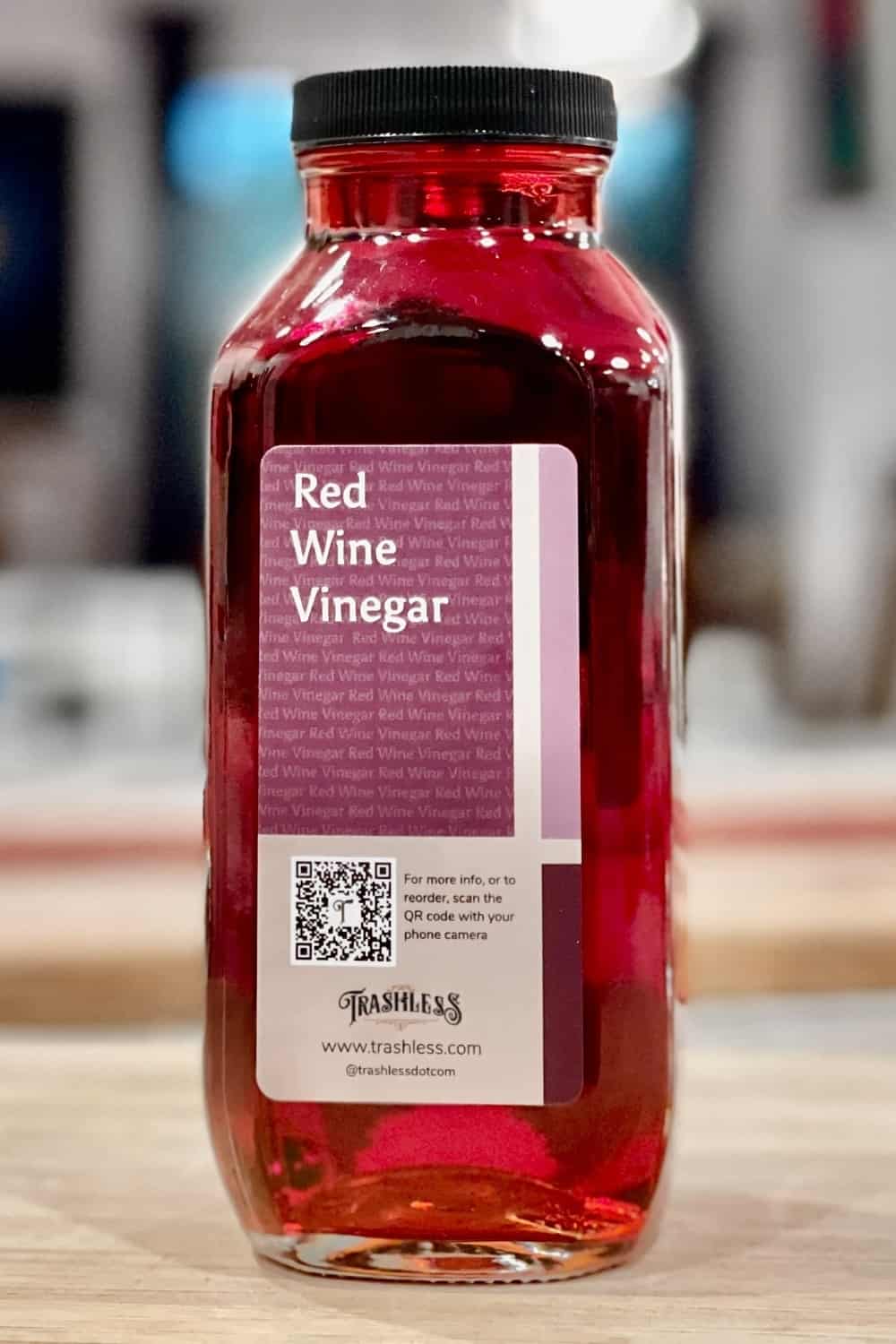
You can easily conclude that this type of vinegar is made from red wine, i.e. by fermenting red wine, allowing the acetic acid bacteria to convert the alcohol in the wine into acetic acid. It is not a perfect sub, but it can work in some dishes.
Similarities:
• They both have a tangy and acidic taste, i.e. they add a bright and zesty flavor to dishes.
• Like other vinegars, both Champagne vinegar and red wine vinegar have certain health benefits. They contain acetic acid, which has been associated with potential digestive benefits and may help regulate blood sugar levels.
Differences:
• Champagne vinegar is made from Champagne or sparkling wine, which is produced from specific grape varieties, while red wine vinegar is made from red wine, which is produced from various red grape varieties.
• Their flavor profiles are different, i.e., Champagne vinegar offers a delicate and refined flavor profile, while red wine vinegar has a robust and tangy flavor.
• Although both types of vinegar are acidic, red wine vinegar tends to have a higher acidity level compared to Champagne vinegar.
How To Use As A Substitute:
Red wine vinegar has a different flavor profile than Champagne vinegar, i.e., it is a more tangy and robust flavor that lacks sweetness. Because of that, it is important that you make some adjustments.
Due to the stronger and more intense flavor, you may have to use less of it in your recipes. You can also dilute it with water or another liquid component.
To solve the lack of sweetness, it is not a bad idea to add some type of sweetener, i.e. small amounts of sugar or honey, for example.
When it comes to dishes in which red wine vinegar thrives, my advice is to use it in salad dressings, marinades, sauces, and pickling.
7. Raspberry Vinegar
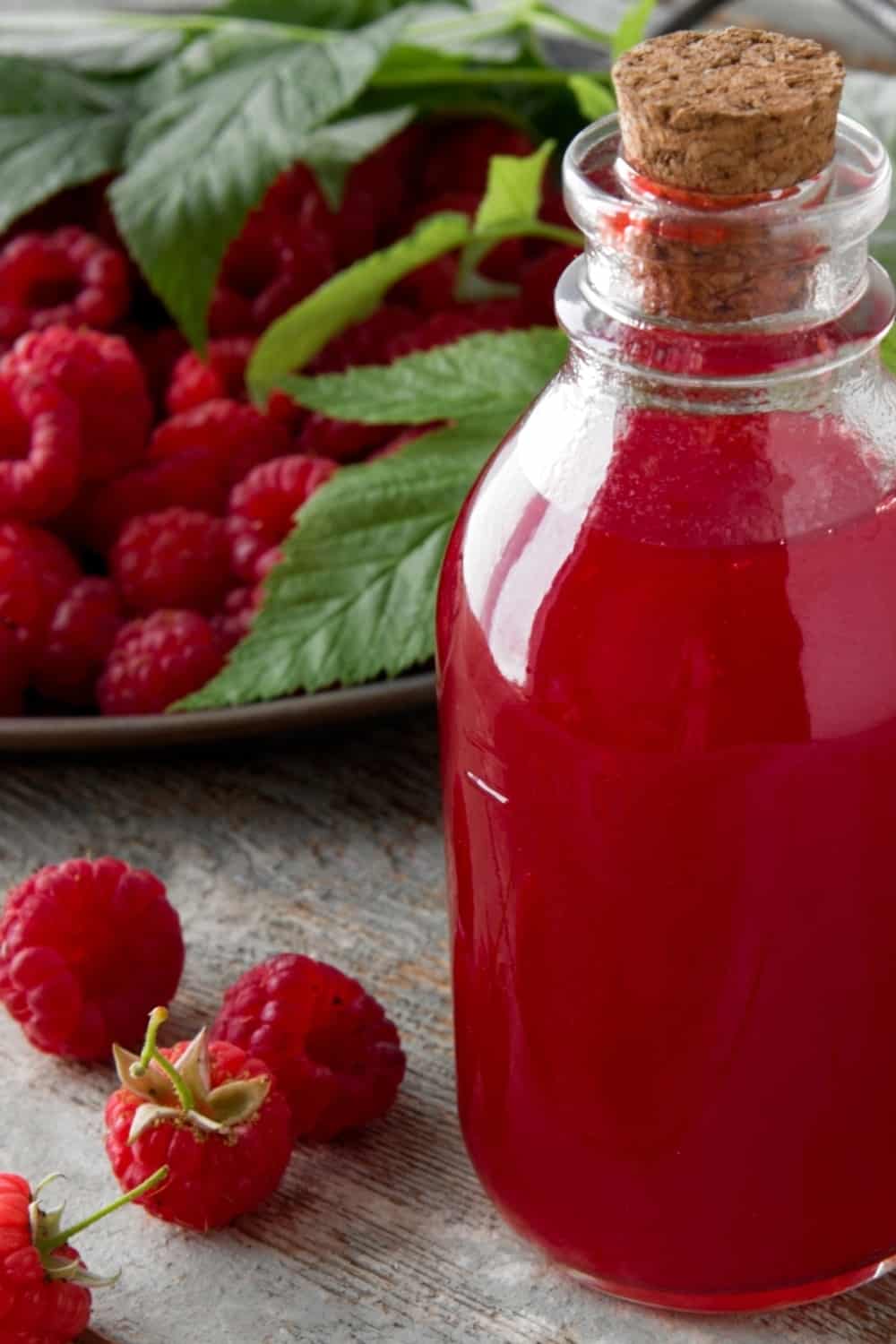
Raspberry vinegar is a different type of vinegar since it is produced by combining raspberries with vinegar, typically white wine vinegar or red wine vinegar, and allowing the flavors to infuse over time.
Similarities:
• Both raspberry vinegar and Champagne vinegar undergo an infusion process. In both cases, the fruit or wine imparts its flavors into the vinegar, creating a distinct taste profile.
• They offer similar fruity flavor notes, i.e., raspberry vinegar has a pronounced raspberry flavor, while Champagne vinegar, although not fruit-infused per se, carries some of the characteristics of Champagne or sparkling wine, which can have subtle fruitiness.
• Both raspberry vinegar and Champagne vinegar have a tangy profile. The acidity of the vinegar provides a bright and refreshing taste that can enhance the flavors of various dishes.
Differences:
• Since the base ingredients are different, the flavor profiles are different too. Raspberry vinegar offers a pronounced raspberry flavor with a tangy and slightly sweet taste.
• Unlike Champagne vinegar, raspberry vinegar brings a distinct aroma of fresh raspberries, which adds to its overall sensory experience.
• Raspberry vinegar is primarily used for its fruity flavor and is particularly well-suited for recipes that benefit from a tangy and sweet note.
Champagne vinegar, with its delicate and nuanced flavor, is often considered a gourmet ingredient.
How To Use As A Substitute:
As you already know, their flavor profiles as well as their intensity are different. Namely, raspberry vinegar tends to be more intense and has a stronger flavor compared to Champagne vinegar.
It is therefore always better to use a smaller amount of it in your recipes.
In general, raspberry vinegar is most popular in the summertime when it is used to top salads and meat for an extra sweet yet tart fruity flavor.
Besides that, you can also use it in various other dishes, including sauces, marinades, and vinaigrettes where its fruity tang can also add a vibrant element.
It can also be used as a finishing touch, drizzled over fruits and desserts, or even incorporated into cocktails for a unique twist. It is a truly exotic type of vinegar.
8. Herb Vinegar
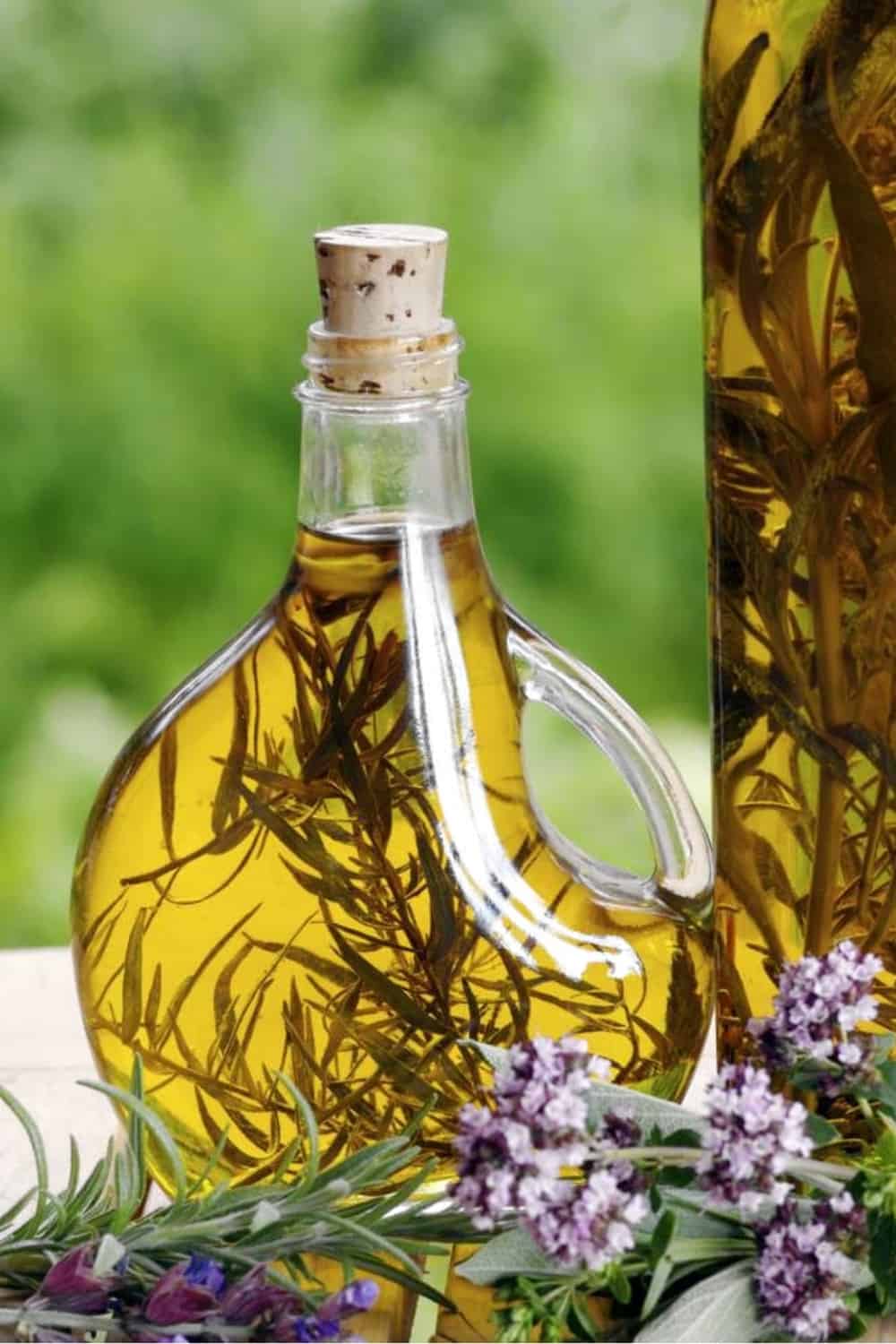
Herb vinegar is a type of vinegar that is infused or flavored with various herbs. All kinds of herbs can be used and that is a huge advantage in terms of adjusting the right flavor profile when using it as a substitute.
Similarities:
• Both herb vinegar and Champagne vinegar undergo an infusion process to develop their flavors.
Herb vinegar is made by steeping fresh or dried herbs in vinegar, while Champagne vinegar is made by infusing Champagne or sparkling wine, allowing the unique characteristics of the wine to meld with the vinegar.
• Both herb vinegar and Champagne vinegar are used to enhance the taste of dishes. They add depth and complexity to recipes, elevating the flavor profile and making the dish more interesting in terms of flavor.
• Both of these types of vinegar can be made at home. Making herb vinegar allows for customization by selecting specific herbs or herb combinations based on personal preference.
Differences:
• Infusion ingredients are different, so the flavor profiles are also different, which is quite logical indeed. The flavors of herb vinegar can range from mild and earthy to aromatic and herbal, depending on the herbs used.
• Unlike Champagne vinegar, one made from herbs can add distinct herbal aromas to dishes, depending on the herbs used in the infusion. The aroma can range from fresh and grassy to pungent and aromatic.
• One very positive difference is the fact that herb vinegar can offer versatility in terms of flavors based on the herbs used in the making process, while Champagne vinegar has only one flavor profile.
How To Use As A Substitute:
There are different types of herb vinegars, but in general, most of them are more intense compared to Champagne vinegar.
So, in order to make a successful substitute, you may need to use slightly less of the herb vinegar to avoid overpowering the dish with its herbal taste.
Herb vinegar can work well in recipes where herbs are already present or where the herbal taste complements the dish.
Consider using it in salad dressings, marinades, vinaigrettes, sauces, and other recipes that benefit from the herbal infusion. It can also be used as a finishing touch or drizzled over cooked vegetables, roasted meats, or grilled fish for added flavor.
9. Balsamic Vinegar
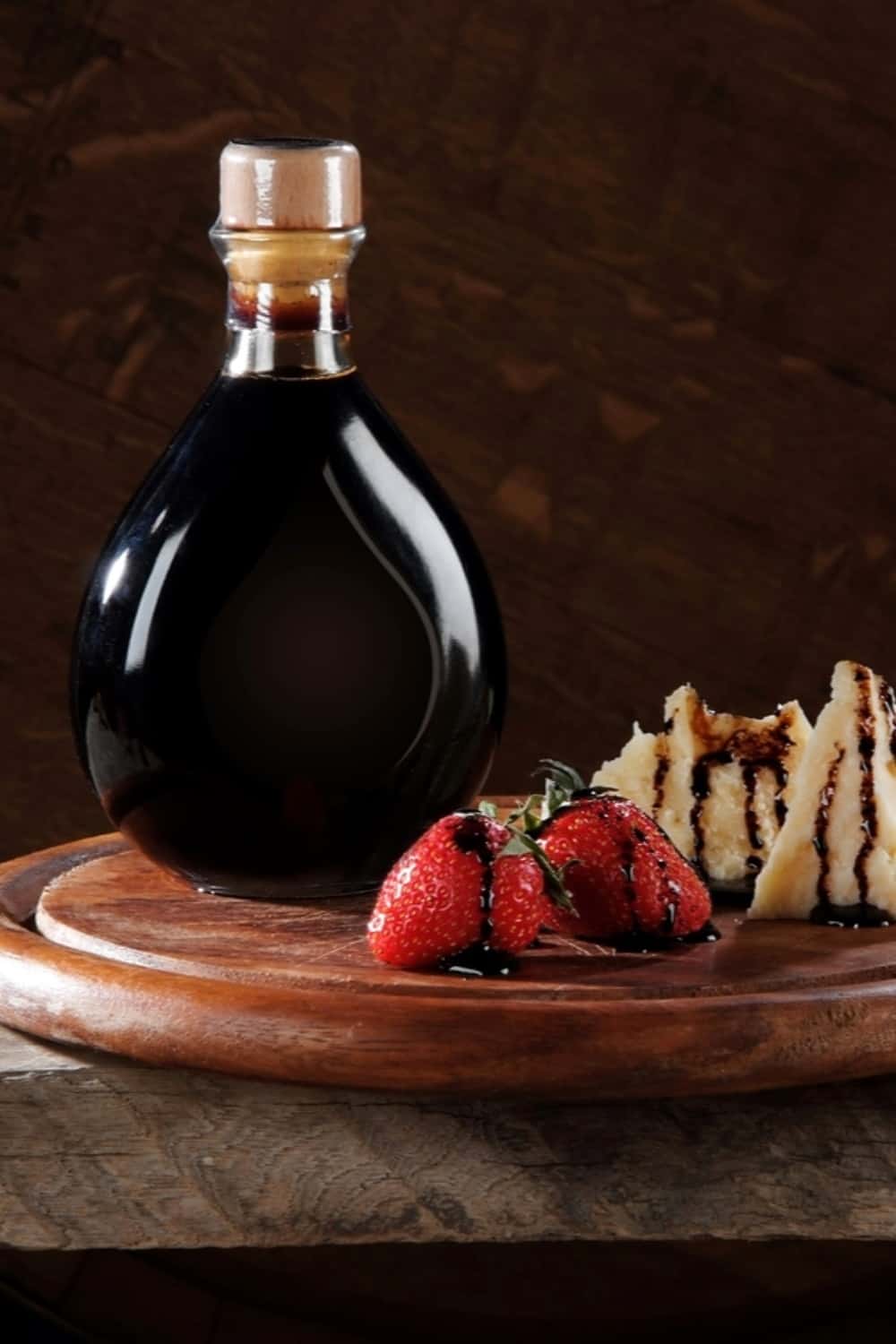
A type of vinegar that originated from Italy, Balsamic vinegar, is made from the must, which is the freshly crushed grape juice of specific varieties of grapes, typically Trebbiano and Lambrusco grapes.
Similarities:
• Both balsamic vinegar and Champagne vinegar are considered gourmet ingredients that add depth and complexity to dishes.
• Both vinegars have the ability to enhance the flavor of various dishes.
• They also offer a balanced level of acidity, which can provide a pleasant contrast to the flavors of the other ingredients in a recipe. The acidity helps to brighten and balance the overall taste of the dish, adding a refreshing element.
Differences:
• The specific production process is different.
Balsamic vinegar is made from the must of specific grape varieties, which is simmered and reduced to concentrate the flavors.
It then undergoes a long aging process in wooden barrels, typically oak, cherry, or chestnut, for a minimum of 12 years.
• Balsamic vinegar is known for its rich, sweet, and complex flavor profile, and it offers a balance of sweet and tangy notes, with hints of caramel, fruitiness, and sometimes a touch of acidity.
Champagne vinegar, on the other hand, has a delicate and nuanced flavor profile.
• Balsamic vinegar is renowned for its aging process, which can span from 12 to 25 years or even longer for traditional balsamic vinegar.
Champagne vinegar is not typically aged for an extended period like balsamic vinegar.
How To Use As A Substitute:
Balsamic vinegar doesn’t have the same flavor profile as Champagne vinegar and it tends to be more intense, so you definitely need to take that into consideration when making a substitution.
You can use the same amount of balsamic vinegar as the recipe calls for Champagne vinegar, but if you find its flavor too overwhelming, you can lower the amount as well.
Balsamic vinegar is known for its role in making salad dressing taste amazing, so that is definitely the first choice. It also works well in marinades for meat, as well as in sauces.
You can also use it to create reductions and glazes, as well as in roasted vegetables and various fruit-based dishes.
10. Coconut Vinegar
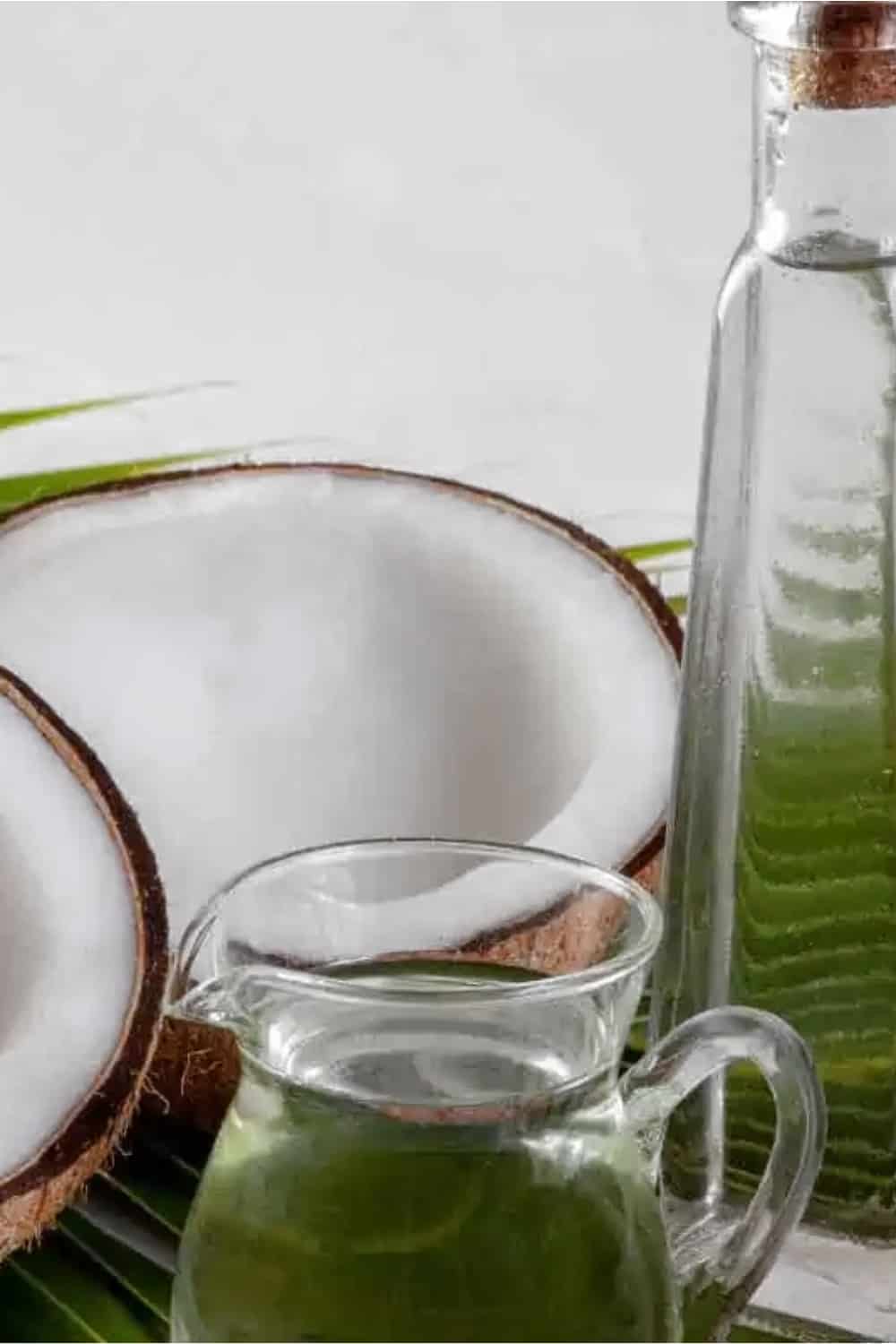
My last recommendation is coconut vinegar, a type of vinegar made from the sap of coconut trees. It is commonly produced in regions where coconuts are abundant, such as Southeast Asia, the Philippines, and parts of India.
Similarities:
• Both types of vinegar are made through a fermentation process.
• Although not the same, both types of vinegar has a certain amount of acidity.
• Both kinds of vinegar are believed to offer potential health benefits. Coconut vinegar is said to have antibacterial properties, aid in digestion, and provide certain nutrients.
Differences:
• The primary difference lies in the raw materials used for production. Coconut vinegar is made from the sap of coconut tree flowers, whereas Champagne vinegar is made from Champagne or other wines.
• Obviously, their flavor profiles are also different, i.e., coconut vinegar has a mild and slightly sweet flavor with a subtle coconut aroma and slight acidity that is not overpowering.
• Coconut vinegar is not as available as Champagne vinegar, but it tends to be less expensive.
How To Use As A Substitute:
Coconut vinegar’s slight coconut flavor can work well in dishes with tropical or Asian influences. It pairs well with ingredients such as seafood, tropical fruits, curries, and stir-fries.
However, you must be aware of the fact that their flavor profiles and acidity levels are not the same.
Coconut oil provides a subtle sweetness and it also has milder acidity compared to Champagne vinegar.
So, if you want a more subtle and milder marinade or sauce with a touch of sweetness and specific tropical flavors, you can always add some coconut vinegar.
See Also: 15 Best Substitutes For Coconut Sugar To Sweeten Your Treat

